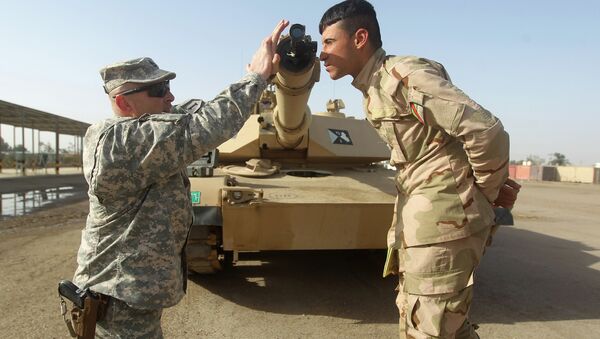Radio Sputnik discussed the possibilities of the withdrawal of foreign troops from Iraq with Dr. Munqith Dagher, President and Chairman of the Independent Institute for Administration and Civil Society Studies (IIACSS), a pioneering public opinion and marketing research company in Iraq.
He stated in the interview, “The Iraqi government still needs as it has been clearly stated by the Prime Minister, still needs some kind of existence of foreign troops even if it’s not operational troops. But they will need definitely for more training, more logistical support, and some other kind of support in the battle against Daesh* and other terrorist groups in Iraq. Daesh* was defeated militarily but there are many sleeping cells still there, the ideology is there as well. So we cannot expect that this battle has been closed, or has been finished.
Sputnik: We’ve got an interesting paradox with regard to the geopolitical situation with Iraq. Prime Minister Abadi’s two biggest military allies are the US and Iran, so with that in mind in what position is this demand put onto him? How could this impact Abadi’s bid to take office for his second term in May. What are your thoughts on that?
Dr. Munqith Dagher: It’s clear that Abadi is the best choice by far for the neighboring countries and even for the global superpower. Because has proved he can unify the Iraqis and he can achieve much better results than his successor. But, and for sure this will be reflected in the next election, Abadi’s popularity among the Iraqis is very-very high, different regional countries and the US as well realize he is so popular, he is the best option by far. So I expect he will receive big support in the next election.
Sputnik: A spokesman for the US led coalition has stated on record that the presence of the US troops hinged on Iraq government approval, but do you think it’s likely that they would actually depart. It seems to me they are going to stay there for a further amount of time by the looks of the things in that particular part of the world.
Dr. Munqith Dagher: I think they will stay; the Iraqi government approves that, although the Parliament has requested a timetable for their withdrawal. I expect that even if that withdrawal will be a minor withdrawal, there will be troops on the ground, mostly for logistical and training support. This is so important. By the coming month we will see may be less existence of the US troops, but there is a need in the Iraqi government, as for that need there will be a kind of existence on the ground.
READ MORE: Up to 841 Civilians Killed in US-Led Operations in Syria, Iraq – Coalition
Sputnik: What’s your particular take on the American influence in the region, and what consequences could this US influence have now in the Middle East moving forward. What’s your prognosis?
Dr. Munqith Dagher: I think the current administration is trying to be more involved in the region, though it’s clear that there is no clear strategy, it’s only an involvement. I do believe that there’s real need for dialogue between all powers on the ground, whether regional powers, different countries and even superpowers. This cannot be solved by war, but definitely this will not solve things on the ground. And eventually everyone will realize that there will be a need for a roundtable to discuss and put all regional and local issues on the table, and kick off a real and open dialogue between different powers.
The views and opinions expressed in this article are those of the author and do not necessarily reflect those of Sputnik.
*Daesh (also known as ISIS/ISIL/IS) is a terrorist group banned in Russia



